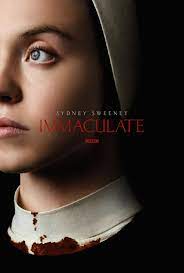
IMMACULATE
Italy/US, 2024, 89 minutes, Colour.
Sydney Sweeney, Alvaro Morte, Simona Tabasco, Benedetta Porcaroli, Dora Romano, Giulia Heathfield de Renzi, Giuseppe, Lo Piccolo.
Directed by Michael Mohan.
When Christians hear the word “Immaculate”, they usually think of the Virgin Mary, perhaps remembering the Immaculate Conception or the Virginal Conception of Jesus – many confusing the two. And the connection for this film, Immaculate? The connection is correct. Many Catholics would be interested in knowing what the connections in this film are, especially when they discover that it is, basically, a horror film.
This review will first make a comment on how it works as a horror film as such – which is how it will be viewed by most audiences around the world, audiences not familiar with the Catholic themes, viewing it without much awareness of the references. In fact, looking at the immediate response by bloggers and commentators on the Internet Movie Database, most of them do not mention the religious themes at all, for them it is another horror film.
So, a horror film. It is well-made, an initial shock of a character buried alive, the background of Cecilia, the central character, her arrival in Italy, a sense of foreboding, strange characters, dreams, her becoming a victim, pregnant, the mystery behind the pregnancy, her revolt, increasing blood, shocks, grim deaths. As a horror film, within its genre and conventions, above average.
Then the Catholic atmosphere of the film. One is tempted to state “over-the-top” or, even “bonkers”. The background of Cecilia (Sydney Sweeney) is well-established, a childhood accident in the ice, saved, her feeling of God choosing her for a vocation, her parish closing for lack of parishioners, the invitation to travel to Italy, to a convent, making her vows and working with young nuns assisting in aged care for a large number of elderly sisters.
Not what you would expect, especially a number of odd characters, the large number of elderly sisters and care, some bizarre behaviour, rather sect -like community with its own resident Cardinal, priest chaplain and deacon.
But, halfway through, the plot has an unexpected revelation that moves it out of what seems to be supernatural invention to the reality of bizarre science fiction, a convent variation on the Rosemary’s Baby theme.
For interested Catholic audiences, the plot twist demands attention and leads into the realm of religious fanaticism and expectations of the Second Coming. These themes will find their place (and analysis) in future articles and books on films with Catholic themes.
For horror fans, yes. But not for those who do not like films they see as exploiting the Church. But, despite the bonkers, it does have interesting religious themes.
- Blend of horror and religion? Catholic traditions? Sect communities and aberrations? The opening, the nun getting up, trying to escape, the locked gate, her being buried alive?
- The title, overtones of the Virgin Mary, the virginal conceptions? Nuns and the vows of chastity?
- The American background, Cecilia, her life and the parish, the accident, saved, sense of called by God? Travel to Italy, the deacon meeting her, travel to the countryside, the imposing building, aged care for the sisters, from 1632, the catacombs underneath? The large community, the aged sisters, the younger sisters and their care? The resident priest? The resident deacon? The resident Cardinal?
- The Catholic traditions, but inventions by the writer, the nature of the convent and community, behaviour, rituals, chapel, prayer, the choir, the rooms with the nuns, the habits, the young nuns, the making of vows? Community life?
- The musical score, Schubert’s Ave Maria?
- Cecilia, age, experience, goodwill, the powers, the encounters with Isabelle and her severity, the encounters with Gwen, smoking, swearing, her past story, attitudes? The older sisters, attending them, dementia, physical illness, deaths? The role of the Superior, severity?
- The dialogue in Italian, subtitles, the dialogue in English, Cecilia not understanding Italian?
- Cecilia, her dreams, the sinister? Time passing, the ups and downs? The discussions with the priest, his enthusiasm and encouragement? The Cardinal, his presence at the convent, receiving the vows, Cecilia kissing his ring, the deacon and his work?
- The interrogation of Cecilia, intrusive, sexual behaviour? The revelation that she was pregnant? The reaction of the sisters, dressing her as the Virgin Mary, veneration, special meals, treatment? Isabelle and her reaction? When?
- The change in the middle of the film, the revelation of the laboratory, the symbolism and reality of the name nail, brought by St Helena, the relic of the blood and bone of Jesus? The laboratory, the priest and his genetics and science training, the deacon assisting, the impregnation of the nuns? For a birth of the Messiah? An aberrant faith?
- The explanation of the nuns with the red feet, Cecilia and the symbol burned onto her foot, the tour of the laboratory, the range of foetuses, failures over 20 years, the range of nuns in the conference, the elderly and the experiments? Isabelle and her suicide?
- The signally of the trimesters, the effect on Cecilia? The community? Everybody venerating her?
- The pregnancy, coming to tern, the effect on Cecilia, behaviour of the nuns, the control of the priest, the doctor, the cardinal, Cecilia and her mental condition, physical? Wanting to escape?
- The buildup to the combination, Cecilia and her brutal attack on the Superior, strangling the cardinal, in the laboratory, the role of the priest, locking him in, his seizing her, the bloated, as beginning a cesarean cut, Cecilia’s attack on him, his being burnt and escaping? Fleeing through the catacombs? The terror, the pursuit, the final confrontation?
- The catacombs, the dead sister, final escape, giving birth, her reaction to the child, holy or demonic, getting the rock, crashing the child?
- The film working as a horror film irrespective of the religious themes? The use of Catholic themes and Catholic and religious response?